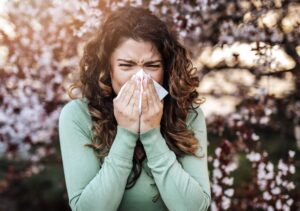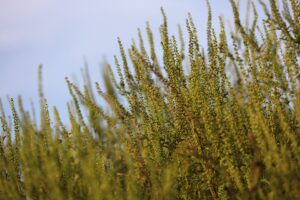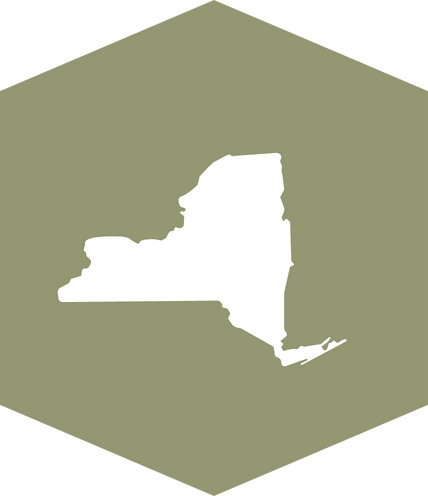Allergy Season Relief: Natural Cannabis Approaches for Fall Symptoms

Allergy Season Relief: Natural Cannabis Approaches: What You Should Know
For people with allergies, fall can be a dreaded time because of allergy symptoms including itchy eyes, sneezing fits, and that constant stuffiness. The causes of fall allergies are many. They include ragweed, which pollinates in the late summer and early fall, as well as mold, which thrives in damp leaf piles, along with dust and pet dander, among others.
Standard treatments for allergies including antihistamines and decongestants can help, but their side effects can be almost as bothersome as the allergies themselves. This has led some people to seek natural cannabis approaches for relief from fall allergy symptoms.
Before we dive into how cannabis could help people suffering from the effects of allergies, let’s first look at what causes them.
Understanding Fall Allergies
Essentially, allergic reactions are a misfiring of the body’s immune system. When someone sensitive to an allergen, such as ragweed or mold, breathes those particles in, the body mistakes them for invaders. The immune system then releases histamines and other chemicals, and they cause a stuffy nose, watery eyes, and itchy skin.
Allergies are especially bad in the fall because of ragweed, which pollinates in the late summer and early fall. Another instigator is mold, which thrives in damp leaf piles. Put them together and allergy sufferers don’t stand a chance.
The Endocannabinoid System and Immune Response
Cannabis may help ease fall allergy symptoms. It all starts with the body’s endocannabinoid system (ECS) and immune response. The ECS is a network of receptors (CB1 and CB2) and naturally produce molecules that help regulate balance in the body: mood, sleep, pain perception, and immune response.
These CB2 receptors are thought to play a role in controlling inflammation. When cannabinoids such as THC and CBD for allergies interact with these receptors, they may help calm down the overactive immune signaling that drives allergy symptoms. This interaction is often described as cannabis and immune modulation, reflecting how cannabinoids can influence the way the immune system responds.
This is supported by a 2020 review in the journal, Frontiers in Immunology which concluded that cannabinoids and inflammation are closely linked. While not focused on allergies, the research suggests cannabis may help prevent the false alarms that ragweed and mold set off in the immune system.
Anti-Inflammatory Properties of Cannabinoids
While there’s still not enough research to proclaim cannabinoids as the penicillin of allergy care, early findings show promise, with several compounds showing anti-inflammatory effects.
The first is THC (tetrahydrocannabinol). In addition to its well-known psychoactive effects, THC has been observed in studies to reduce pro-inflammatory cytokines, the chemical messengers that tell the body to “ramp up” its immune system reaction.
The second compound is CBD (cannabidiol), a widely studied non-psychoactive cannabinoid. CBD appears to influence multiple pathways that reduce inflammation, including suppressing immune cell activity linked to allergies.
The third compound is CBG (cannabigerol). This lesser-known cannabinoid is currently being researched for both its anti-inflammatory and antibacterial properties.
Potential Benefits of Cannabis for Allergy Symptom Relief
This is all encouraging news for allergy sufferers who dread the coming of fall. Early research and reports from patients suggest that cannabis may help head off the overreactions that trigger these specific allergy symptoms such as a stuffy nose, itchy skin, and a lack of sleep.
Some patients report better tolerance and fewer respiratory issues with CBD-dominant strains or those rich in terpenes linked to anti-inflammatory effects, such as pinene. While strain-specific research is still lacking, the promise of natural cannabis approaches for fall allergy symptoms is real.
Methods of Cannabis Consumption for Allergy Relief
When it comes to using cannabis for allergy relief, how you take it may matter as much as what you take. Different methods of consumption can change how quickly the effects begin, how long they last, and which symptoms are most likely to improve.
Inhalation (smoking, vaping) provides rapid onset but may irritate already-sensitive airways in patients with cannabis and respiratory health concerns.
Oral consumption (edibles, tinctures, capsules) is slower to take effect but offers longer-lasting relief. It is useful for symptoms that persist throughout the day.
Topical applications, such as creams or balms infused with cannabinoids, may help with localized skin irritation from allergic reactions.
As always, dosing should start low and increase gradually under medical guidance. Patients should also be aware of possible side effects, which include dizziness, fatigue, or dry mouth.
Legal and Medical Considerations
Access to medical cannabis is controlled by the states. And within those states where cannabis is legal, there is still a lot of inconsistency as well as gray areas. For example, some states include allergies or related conditions (such as chronic inflammation) as qualifying criteria for the legal status of medical cannabis, while others do not.
Even in the states where cannabis is legal, it’s important that you speak with your healthcare providers before use — especially since cannabis may interact with medications often used for allergies, such as antihistamines or steroids. A qualified medical professional can help determine if cannabis is a safe way of treating or preventing your seasonal allergy symptoms.
Alternative Natural Remedies and Lifestyle Adjustments to Combat Fall Allergies
Cannabis has shown encouraging potential for dealing with allergies. However, it’s not the only natural choice. Many patients also turn to other supportive strategies. Some focus on diet, following anti-inflammatory eating patterns that include omega-3 fatty acids, fruits, and vegetables, which may help ease seasonal allergy symptoms.
Others use herbal remedies such as quercetin, stinging nettle, and butterbur, which have all been studied for their role in allergy relief. Environmental adjustments can also make a difference. Simple steps such as using air purifiers, showering after spending time outdoors, and keeping windows closed on high-pollen days may reduce allergen exposure.
Natural Cannabis Approaches for Allergy Season Relief: What’s Next?
Early research into cannabis and its potential to counteract inflammation caused by allergies by interacting with the body’s endocannabinoid system is promising.
While more research is needed, there’s good reason to believe that natural cannabis approaches for fall symptoms could offer real allergy season relief.
Compassionate Clinics of America has been working since 2017 to educate patients on medical cannabis and how exploring this type of medicine can positively affect many parts of one’s life, health, and wellness.
If you are interested in exploring cannabis medicine for the treatment of seasonal allergy symptoms, reach out to us to book your telemedicine appointment.
























